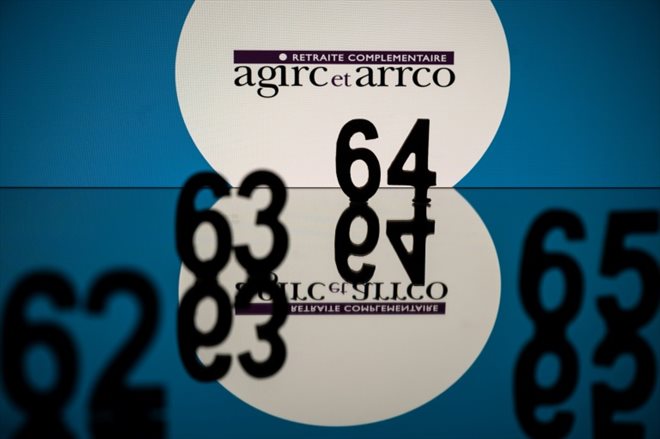Logo of Agirc Arrco, January 6, 2023 in Toulouse (AFP/Archives/Lionel BONAVENTURE)
Where will the billions from Agirc Arrco go? Union-employer negotiations on private supplementary pensions end on Wednesday evening, with the hope of a significant increase in pensions, however thwarted by the executive which wants to drain the system.
This final round, which begins at 3:00 p.m., “promises to be difficult” and “should continue late”, warned FO negotiator, Michel Beaugas.
The agreement should contain the two “priorities” of the unions: the elimination, at least for retirees affected by the pension reform, of the “bonus/malus” — the temporary discount of 10% applied since 2019 to many supplementary pensions — and a revaluation of pensions indexed to inflation (or close to it) this year. “The discussion will be tough” for the years 2024-2026 – the agreement will cover the period 2023-2026 –, warns Yvan Ricordeau (CFDT).
Managed by social partners, Agirc-Arrco pays more than 87 billion euros to 13 million retirees each year. This additional part represents between 20% of the total pension for precarious employees and 60% for certain executives.
The last four-year framework agreement, concluded in 2019, is coming to an end. Three employers’ organizations (Medef, CPME, U2P) and five representative unions (CFDT-CGT-FO-CFTC-CFE CGC) must absolutely agree on the rules applicable on November 1.
After several agreements which required efforts from retirees, the coffers of Agirc-Arrco are full: 68 billion euros in reserves, or nearly ten months of advance payments (its golden rule requires keeping the equivalent of six months, over a 15-year horizon).
Pension reform should bring an additional 22 billion over 15 years.
– Inflation –
The unions are demanding an increase in supplementary pensions of between 5% and 5.2% on November 1 – equivalent to that announced for the general system – then indexed each year to inflation.
Without giving figures, Medef representative Diane Milleron-Deperrois wanted to “dissociate” the year 2023 and the period 2024-2026. “Inflation is a new subject”, she noted, but it is necessary “to find possible under-indexations, to have an economic balance”.
Another subject of discussion, the penalty. Established in 2019, it was to encourage employees to work one more year – at the time until age 63 – even though they had met all the legal conditions to leave. Otherwise, they saw their pension cut by 10% for three years. A “bonus” was granted for two to four years of additional work.
Several unions are pleading to “stop the penalty” for the 700,000 people who have already left with the reduction, an option rejected by the employers. The measure would cost between 7.3 and 8.2 billion over 15 years, depending on the number of beneficiaries.
– “Interventionism” –
The social partners must above all find a solution to the threats of the executive, which is demanding 1 to 3 billion euros annually from the regime – by 2030, after gradual ramp-up – to help finance the increase in “small pensions” provided for by its reform. Otherwise he intends to help himself from the crates.
In view of the surpluses, “we consider it normal for there to be a return to balance in the overall retirement system”, said the Minister of Labor Olivier Dussopt before the association of social information journalists ( Ajis). The current social security financing bill (PLFSS) “can allow us to move forward,” he said.
“There is no question of Agirc-Arrco (…) becoming an adjustment variable for schemes managed by the State”, replied in Les Echos the president of Medef Patrick Martin, worried about this “ interventionism”.
“The State would like to take control of the management of Agirc-Arrco as it has already done in part with Unédic” but “we need freedom for intermediary bodies,” he added. “We intend to negotiate independently.”
Unions and employers are “considering internal solidarity measures” for small pensions, to the tune of 350-400 million annually, summarized Christelle Thieffinne (CFE-CGC). But if the government “steals” a billion, warned Pascale Coton (CFTC), “it will endanger the regime”.
© 2023 AFP
Did you like this article ? Share it with your friends using the buttons below.




